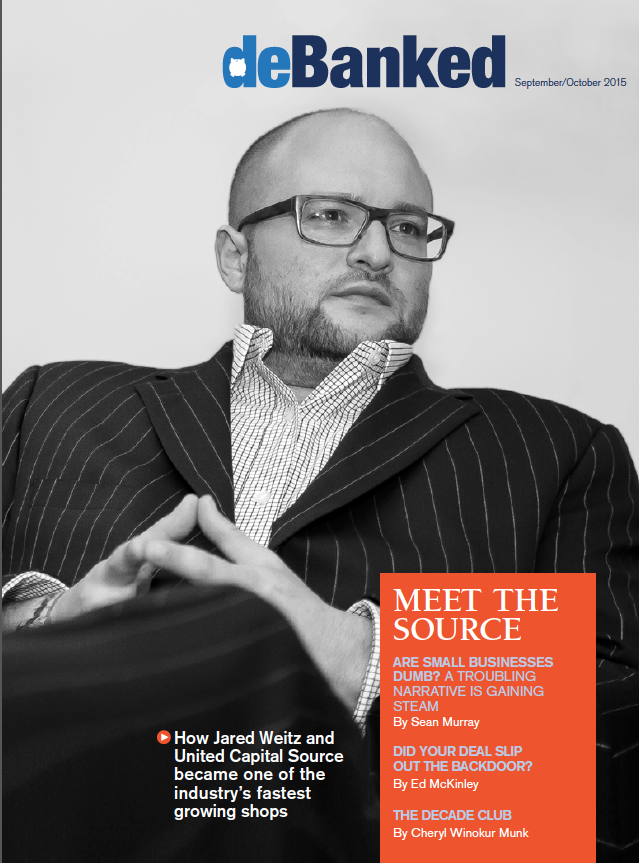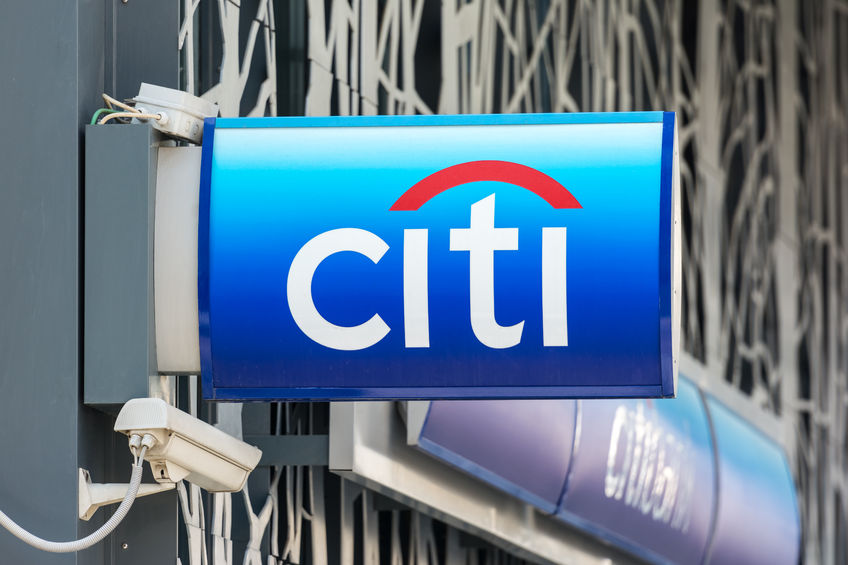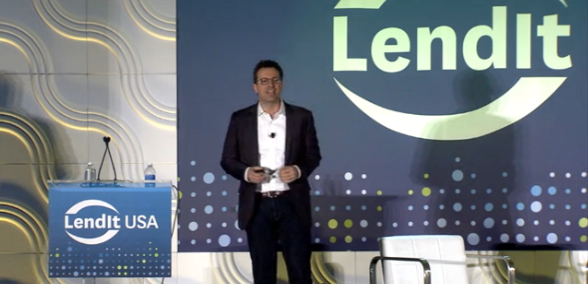Business Lending
Stairway to Heaven: Can Alternative Finance Keep Making Dreams Come True?
April 28, 2016
The alternative small-business finance industry has exploded into a $10 billion business and may not stop growing until it reaches $50 billion or even $100 billion in annual financing, depending upon who’s making the projection. Along the way, it’s provided a vehicle for ambitious, hard-working and talented entrepreneurs to lift themselves to affluence.
Consider the saga of William Ramos, whose persistence as a cold caller helped him overcome homelessness and earn the cash to buy a Ferrari. Then there’s the journey of Jared Weitz, once a 20 something plumber and now CEO of a company with more than $100 million a year in deal flow.
 Their careers are only the beginning of the success stories. Jared Feldman and Dan Smith, for example, were in their 20s when they started an alt finance company at the height of the financial crisis. They went on to sell part of their firm to Palladium Equity Partners after placing more than $400 million in lifetime deals.
Their careers are only the beginning of the success stories. Jared Feldman and Dan Smith, for example, were in their 20s when they started an alt finance company at the height of the financial crisis. They went on to sell part of their firm to Palladium Equity Partners after placing more than $400 million in lifetime deals.
 The industry’s top salespeople can even breathe new life into seemingly dead leads. Take the case of Juan Monegro, who was in his 20s when he left his job in Verizon customer service and began pounding the phones to promote merchant cash advances. Working at first with stale leads, Monegro was soon placing $47 million in advances annually.
The industry’s top salespeople can even breathe new life into seemingly dead leads. Take the case of Juan Monegro, who was in his 20s when he left his job in Verizon customer service and began pounding the phones to promote merchant cash advances. Working at first with stale leads, Monegro was soon placing $47 million in advances annually.
Alternative funding can provide a second chance, too. When Isaac Stern’s bakery went out of business, he took a job telemarketing merchant cash advances and went on to launch a firm that now places more than $1 billion in funding annually.
All of those industry players are leaving their marks on a business that got its start at the dawn of the new century. Long-time participants in the market credit Barbara Johnson with hatching the idea of the merchant cash advance in 1998 when she needed to raise capital for a daycare center. She and her husband, Gary Johnson, started the company that became CAN Capital. The firm also reportedly developed the first platform to split credit card receipts between merchants and funders.
BIRTH OF AN INDUSTRY
 Competitors soon followed the trail those pioneers blazed, and the industry began growing prodigiously. “There was a ton of credit out there for people who wanted to get into the business,” recalled David Goldin, who’s CEO of Capify and serves as president of the Small Business Finance Association, one of the industry’s trade groups.
Competitors soon followed the trail those pioneers blazed, and the industry began growing prodigiously. “There was a ton of credit out there for people who wanted to get into the business,” recalled David Goldin, who’s CEO of Capify and serves as president of the Small Business Finance Association, one of the industry’s trade groups.
Many of the early entrants came from the world of finance or from the credit card processing business, said Stephen Sheinbaum, founder of Bizfi. Virtually all of the early business came from splitting card receipts, a practice that now accounts for just 10 percent of volume, he noted.
At first, brokers, funders and their channel partners spent a lot of time explaining advances to merchants who had never heard of them, Goldin said. Competition wasn’t that tough because of the uncrowded “greenfield” nature of the business, industry veterans agreed.
Some of the initial funding came from the funders’ own pockets or from the savings accounts of their elderly uncles. “I’ve met more than a few who had $2 million to $5 million worth of loans from friends and family in order to fund the advances to the merchants,” observed Joel Magerman, CEO of Bryant Park Capital, which places capital in the industry. “It was a small, entrepreneurial effort,” Andrea Petro, executive vice president and division manager of lender finance for Wells Fargo Capital Finance, said of the early days. “A number of these companies started with maybe $100,000 that they would experiment with. They would make 10 loans of $10,000 and collect them in 90 days.”
That business model was working, but merchant cash advances suffered from a bad reputation in the early days, Goldin said. Some players were charging hefty fees and pushing merchants into financial jeopardy by providing more funding than they could pay back comfortably. The public even took a dim view of reputable funders because most consumers didn’t understand that the risk of offering advances justified charging more for them than other types of financing, according to Goldin.
Then the dam broke. The economy crashed as the Great Recession pushed much of the world to the brink of financial disaster. “Everybody lost their credit line and default rates spiked,” noted Isaac Stern, CEO of Fundry, Yellowstone Capital and Green Capital. “There was almost nobody left in the business.”
RAVAGED BY RECESSION

Perhaps 80 percent of the nation’s alternative funding companies went out of business in the downturn, said Magerman. Those firms probably represented about 50 percent of the alternative funding industry’s dollar volume, he added. “There was a culling of the herd,” he said of the companies that failed.
Life became tough for the survivors, too. Among companies that stayed afloat, credit losses typically tripled, according to Petro. That’s severe but much better than companies that failed because their credit losses quintupled, she said.
Who kept the doors open? The firms that survived tended to share some characteristics, said Robert Cook, a partner at Hudson Cook LLP, a law office that specializes in alternative funding. “Some of the companies were self-funding at that time,” he said of those days. “Some had lines of credit that were established prior to the recession, and because their business stayed healthy they were able to retain those lines of credit.”
The survivors also understood risk and had strong, automated reporting systems to track daily repayment, Petro said. For the most part, those companies emerged stronger, wiser and more prosperous when the crisis wound down, she noted. “The legacy of the Great Recession was that survivors became even more knowledgeable through what I would call that ‘high-stress testing period of losses,’” she said.
ROAD TO RECOVERY
 The survivors of the recession were ready to capitalize on the convergence of several factors favorable to the industry in about 2009. Taking advantages of those changes in the industry helped form a perfect storm of industry growth as the recession was ending.
The survivors of the recession were ready to capitalize on the convergence of several factors favorable to the industry in about 2009. Taking advantages of those changes in the industry helped form a perfect storm of industry growth as the recession was ending.
They included making good use of the quick churn that characterizes the merchant cash advance business, Petro noted. The industry’s better operators had been able to amass voluminous data on the industry because of its short cycles. While a provider of auto loans might have to wait five years to study company results, she said, alternative funders could compile intelligence from four advances within the space of a year.
That data found a home in the industry around the time the recession was ending because funders were beginning to purchase or develop the algorithms that are continuing to increase the automation of the underwriting process, said Jared Weitz, CEO of United Capital Source LLC. As early as 2006, OnDeck became one of the first to rely on digital underwriting, and the practice became mainstream by 2009 or so, he said.
Just as the technology was becoming widespread, capital began returning to the market. Wealthy investors were pulling their funds out of real estate and needed somewhere to invest it, accounting for part of the influx of capital, Weitz said.
At the same time, Wall Street began to take notice of the industry as a place to position capital for growth, and companies that had been focused on consumer lending came to see alternative finance as a good investment, Cook said.
For a long while, banks had shied away from the market because the individual deals seem small to them. A merchant cash advance offers funders a hundredth of the size and profits of a bank’s typical small-business loan but requires a tenth of the underwriting effort, said David O’Connell, a senior analyst on Aite Group’s Wholesale Banking team.
The prospect of providing funds became even less attractive for banks. The recession had spawned the Dodd-Frank Financial Regulatory Reform Bill and Basel III, which had the unintended effect of keeping banks out of the market by barring them from endeavors where they’re inexperienced, Magerman said. With most banks more distant from the business than ever, brokers and funders can keep the industry to themselves, sources acknowledged.
At about the same time, the SBFA succeeded in burnishing the industry’s image by explaining the economic realities to the press, in Goldin’s view.The idea that higher risk requires bigger fees was beginning to sink in to the public’s psyche, he maintained.
Meanwhile, loans started to join merchant cash advances in the product mix. Many players began to offer loans after they received California finance lenders licenses, Cook recalled. They had obtained the licenses to ward off class-action lawsuits, he said and were switching from sharing card receipts to scheduled direct debits of merchants’ bank accounts.
As those advantages – including algorithms, ready cash, a better image and the option of offering loans – became apparent, responsible funders used them to help change the face of the industry. They began to make deals with more credit-worthy merchants by offering lower fees, more time to repay and improved customer service. “The recession wound up differentiating us in the best possible way,” Bizfi’s Sheinbaum said of the changes.
His company found more-upscale customers by concentrating on industries that weren’t hit too hard by the recession. “With real estate crashing, people were not refurbishing their homes or putting in new flooring,” he noted.
Today, the booming alternative finance industry is engendering success stories and attracting the nation’s attention. The increased awareness is prompting more companies to wade into the fray, and could bring some change.
WHAT LIES AHEAD
One variety of change that might lie ahead could come with the purchase of a major funding company by a big bank in the next couple of years, Bryant Park Capital’s Magerman predicted. A bank could sidestep regulation, he suggested, by maintaining that the credit card business and small business loans made through bank branches had provided the banks with the experience necessary to succeed.
 Smaller players are paying attention to the industry, too, with varying degrees of success. Predictably, some of the new players are operating too aggressively and could find themselves headed for a fall. “Anybody can fund deals – the talent lies in collecting the money back at a profitable level,” said Capify’s Goldin. “There’s going to be a shakeout. I can feel it.”
Smaller players are paying attention to the industry, too, with varying degrees of success. Predictably, some of the new players are operating too aggressively and could find themselves headed for a fall. “Anybody can fund deals – the talent lies in collecting the money back at a profitable level,” said Capify’s Goldin. “There’s going to be a shakeout. I can feel it.”
Some of today’s alternative lenders don’t have the skill and technology to ward off bad deals and could thus find themselves in trouble if recession strikes, warned Aite Group’s O’Connell. “Let’s be careful of falling into the trap of ‘This time is different,’” he said. “I see a lot of sub-prime debt there.”
Don’t expect miracles, cautioned Petro. “I believe there will be another recession, and I believe that there will be a winnowing of (alternative finance) businesses,” she said. “There will be far fewer after the next recession than exist today.”
A recession would spell trouble, Magerman agreed, even though demand for loans and advances would increase in an atmosphere of financial hardship. Asked about industry optimists who view the business as nearly recession-proof, he didn’t hold back. “Don’t believe them,” he warned. “Just because somebody needs capital doesn’t mean they should get capital.”
Further complicating matters, increased regulatory scrutiny could be lurking just beyond the horizon, Petro predicted. She provided histories of what regulation has done to other industries as an indication of the differing outcomes of regulation – one good, one debatable and one bad.
Good: The timeshare business benefitted from regulation because the rules boosted the public’s trust.
Debatable: The cost of complying with regulations changed the rent-to-own business from an entrepreneurial endeavor to an environment where only big corporations could prosper.
Bad: Regulation appears likely to alter the payday lending business drastically and could even bring it to an end, she said.
Still, regulation’s good side seems likely to prevail in the alternative finance business, eliminating the players who charge high fees or collect bloated commissions, according to Weitz. “I think it could only benefit the industry,” he said. “It’ll knock out the bad guys.”
BlueVine a Serious Player After Citigroup Investment (And it Could Land Them Citigroup Referrals)
April 27, 2016
When BlueVine announced raising $40 Million from Menlo Ventures three months ago, they raised eyebrows in the marketplace lending community but they didn’t steal the spotlight. That’s because BlueVine’s core focus, invoice factoring, is arguably the least sexy segment of small business finance. Just hearing the phrase invoice factoring is enough to induce one into a coma. That of course is what made the age-old practice ripe for disruption. But even so, BlueVine isn’t limiting themselves to just that.
The company now offers business lines of credit with interest as low as 6.9%, according to their website. That makes them a competitor of OnDeck, Lending Club, Funding Circle and many others in a crowded field.
A new investment from Citigroup however could change everything for them. While the terms from Citi Ventures (the banks’s investing arm) were not disclosed, Arvind Purushotham, told CNBC that it’s possible that Citigroup forms a referral arrangement with BlueVine to help small business customers of the bank find attractive credit. That’s significant because Purushotham is a managing director at Citi Ventures.
Two weeks ago, OnDeck CEO Noah Breslow, told the crowd at the LendIt conference that partnering is a company’s only chance now to gain a real foothold in the industry. Breslow could speak from experience since OnDeck currently has a unique arrangement with JPMorgan Chase.
While the sources interviewed by CNBC stressed that the BlueVine-Citigroup investment did not constitute a commercial partnership, the stage seems to have been set for that to be possible in the future.
Even though BlueVine just started making loans 3 months ago (they have been factoring since 2013), loans already make up 15% of their overall business. This is one invoice factoring company that rival small business lenders won’t want to sleep on.
Is That a Bird, a Plane or a Recession in the Wings?
April 26, 2016
The R-word has been rearing its ugly head with more frequency in recent months, propelled by falling stock prices, higher borrowing rates and the dollar’s ascent.
While a recession—typically defined as a fall in GDP in two consecutive quarters—is far from certain, it would most definitely be a double whammy for an industry that many believe is already ripe for a pullback due to multiple years of unfettered growth. Indeed, many funders have experienced great success riding on the coattails of the long-running favorable market. Some industry participants fear these funders are masking loss rates behind strong volume—a particularly problematic strategy if the volume were to taper off due to an economic downturn.
“It’s no different than what happened in the housing market in 2008,” says Andrew Reiser, chairman and chief executive of Strategic Funding Source Inc. in New York. If and when a recession occurs, several industry participants expect there will be a culling of the weakest firms. They say inexperienced and less-diverse funding companies are particularly at risk, as are MCA funders that don’t keep close tabs on their business dealings. They also believe that venture capital funding will be even harder to come by and regulation will rain down more heavily on the industry.
RISK FACTORS THAT SPELL TROUBLE IN RECESSIONARY ENVIRONMENT
For a variety of reasons, Glenn Goldman, chief executive of Credibly, a New York-based small business lending platform, believes that fewer than 50 percent of the funders today are prepared to weather a recession. Many don’t have strong data science and risk management, for example. Some newer platforms also don’t have the seasoned management to help guide them appropriately, he says.
Another red flag is when funders rely too heavily on a single source of funding. Goldman points back to 2008 when the commercial paper market disappeared. Companies that had on balance-sheet funding capacity were able to weather that storm because they weren’t exclusively relying on commercial paper or securitization, he says.
Goldman believes the prudent way to manage an alternative funding business is to utilize a combination of on-balance sheet financing, whole loan sales and securitization. “If the market moves sideways and you rely only on a single source of funding, you are at risk. It’s an incredibly obvious statement, but it becomes more acute when the economic environment comes under pressure,” he says.
Notably, there are very few sizable alternative funders who successfully survived the last big recession, meaning there are hundreds of companies now doing business in this space that don’t have years-worth of data to help them make more prudent underwriting decisions. Strategic Funding, for example, had the highest loss rate in its history in the third quarter of 2008 and has used its wealth of data to learn from past mistakes. “There’s no doubt that it is critical to be able to correlate events with history,” Reiser says.
Funders are also going to have to batten down the hatches when it comes to their underwriting standards. “Just because someone paid you back yesterday doesn’t mean he’s going to pay you back tomorrow,” Reiser says. “You have to be right more often in a recessionary environment.” Indeed, liquidity for originators and investors will become even more critical in a recession.
“Liquidity is king,” says David Snitkof, chief analytics officer and co-founder of Orchard Platform, a New York-based technology and data provider for marketplace lending. He points out the large number of companies that went belly-up in the last big recession for lack of liquidity. “The more that participants in this market are able to diversify their capital structure, diversify their funding sources and work with multiple providers, the better off they will be,” he says.
Another challenge will be for funders that haven’t had their servicing and collection capabilities adequately stress tested, Snitkof says. These firms should consider working with an outside provider to help them scale their collections as necessary. In this way, a company that needs additional resources can scale up pretty quickly without disrupting operations.
THE P2P OUTLOOK
 To be sure, all types of companies fall under the alternative funding umbrella and each will have its own special challenges in a recession. In the P2P space, for example, having a diverse investor base and a sound credit model will become increasingly important. Peter Renton, an investor and founder of Lend Academy, an educational resource for the peer-to-peer lending industry, predicts that some of the newer P2P platforms will struggle more in a recession. That’s because they haven’t had as much time to accumulate and interpret borrower data and adapt their models accordingly.
To be sure, all types of companies fall under the alternative funding umbrella and each will have its own special challenges in a recession. In the P2P space, for example, having a diverse investor base and a sound credit model will become increasingly important. Peter Renton, an investor and founder of Lend Academy, an educational resource for the peer-to-peer lending industry, predicts that some of the newer P2P platforms will struggle more in a recession. That’s because they haven’t had as much time to accumulate and interpret borrower data and adapt their models accordingly.
Lending Club, for example, has gone through many iterations of its credit model over its multiple years in business, and it’s much better than it was even five years ago, says Renton, who had around $37,000 invested with Lending Club as of the third quarter of 2015. “The best data that anyone can get is payment history with your existing borrowing base,” he says.
Particularly in a recession, P2P players need to be extra careful about maintaining strict underwriting standards. Marketplaces may have to tighten their borrowing standards to lend to more solid companies, so the likelihood of defaults isn’t as great. So, for instance, if their standard was once borrowers with a FICO score of at least 640, they could up it to 660, Renton says.
Platforms also have to make sure they have enough investors to satisfy their borrowers, which is why having a diverse investor base is so important. In a recession if you have three hedge funds and that’s your entire investor base, they could all go away. By contrast, if a platform has five thousand individual investors, they aren’t all going away. You may lose 10 percent or 20 percent of them, but if you still have four thousand investors, you can still have your loans funded, Renton explains.
One way to do well even in a recessionary environment is for P2P players to tweak their credit model to be more restrictive so their default rates are lower. “If your default rates are only 3 percent and your competitors are at 6 percent, you’re going to get more business,” Renton says.
Certainly, alternative funding companies can get into trouble if they don’t act early enough when they see a change in activity and economic performance, says Ron Suber, president of Prosper Marketplace, a P2P lender based in San Francisco. Funders need to be able to nimbly adjust their pricing, risk models and expected default rates as needed. “Every marketplace will see a change in borrower behavior as unemployment increases and there are economic declines. Therein lies the question: what does the marketplace do?” Prosper, for instance, recently raised rates on loans, telling investors it had increased its estimated loan loss rates and therefore was updating the price of loans to reflect increased risk. Understanding risk and pricing loans accordingly is always important, but even more so in a shaky economic environment. “You always have to stay on top of it,” Suber says.
 MANY MCA FUNDERS AT HIGH-RISK IN RECESSION
MANY MCA FUNDERS AT HIGH-RISK IN RECESSION
If a recession strikes, some observers believe the risk to certain MCA funders will be particularly acute. That’s because new players have entered the MCA space over the past several years, and a sizable number of them don’t have a good handle on their business. Higher default rates could force many of them to shutter operations. Certainly merchants especially those with bad credit—will need more access to capital during a recession and MCA is a natural place for these businesses to turn. But MCA funders have to do a better job of adjusting for risk and keeping adequate records if they hope to weather an economic downturn, says Yoel Wagschal, a certified public accountant in Monroe, New York, who has worked with a number of struggling MCA funders. “A small recession could lead to big failures if you don’t take the right steps,” he says.
To avoid business-threatening issues, Wagschal recommends that MCA funders take steps now to develop stronger underwriting systems to vet merchants better. He believes it’s more prudent to do fewer deals with higher rated merchants than to continue taking on risky businesses as customers. If they see more defaults are coming in, funders should also consider raising their factor rates, he says. Another option is to halt new funding for three to four months to re-energize the business. “It’s much harder to make money than to lose money,” he notes.
If they don’t already have them—and many don’t—MCA funders also need to invest in a good accounting system that can flag their profits, losses and defaults on a real-time basis. This information allows funders to make swift decisions about the business so they can take necessary steps at the right time, he says. “You don’t wait for months, or year end, to analyze all the facts. You might have already lost your business and lost your money because money is just turning around so quickly.”
UNCERTAINTY ABOUNDS FOR VENTURE CAPITAL INVESTMENT
Existing funders won’t be the only ones to struggle in a recession; the well of venture capital funding for new entrants could easily dry up as well,like it did in the last big recession. That’s not to say VC firms will lose interest entirely, but new funders will have to work even harder to get noticed. “There are so many originators, for any new entrants, the bar gets higher and higher to prove that you have something truly unique,” says Snitkof of Orchard Platform. Reiser of Strategic Funding already sees this scenario playing out. “I don’t think the market [lately] has been very favorable to our space,” he says, noting the dearth of exit strategies that have made it riskier for VC firms to invest. “It’s always easy to get in; it’s hard to get out,” he says.
GET READY FOR MORE REGULATORY ACTION
Industry watchers also believe the alternative funding industry will become more heavily regulated in a recession and its aftermath.
Reiser points to all the additional restrictions placed on the mortgage industry in the wake of the housing market bust in 2008. At a time when the housing market was restricting, you had more compliance placed on it as well. “I think you’ll have more compliance in our industry too. That’s just another cost that will have to be absorbed,” Reiser says.
In a recession, there’s more likelihood that harm can come to customers and that will drive regulatory action as well, he adds.
THE ART OF MAKING TOUGH DECISIONS
If the economy turns south, many alternative funders will be forced to make tough underwriting decisions. It can be hard if your analysis of data tells you that things are going to turn downward and your competitors don’t take the same stance, says Stephen Sheinbaum, founder of Bizfi, a New York-based online marketplace.
In that case, funders have to decide whether they are willing “to tighten and pivot while the rest of the players in the space are going full steam ahead,” he says. “That’s where you have to have some conviction and trust your data and do the right thing.”
Of course, even as the rest of the economy is faltering, recessionary times can also be a boon for enterprising companies. For example, the 2008 recession turned out to be positive for Bizfi, which at the time was called Merchant Cash and Capital. Using housing starts, consumer spending and other data, the company correctly predicted the economy was going to take a severe turn downward. It therefore made tweaks to its underwriting guidelines, moving into certain industries and away from others it deemed riskier. “Change can be hard, but it can be for the better,” Sheinbaum says.
Indeed, alternative funders that embrace new opportunities can be successful even in a broad economic downturn. “It’s about having the foresight to be able to discern good from bad and just being really disciplined about it,” says Snitkof of Orchard Platform.
Shark Tank’s Kevin O’Leary Has a Man-to-Man Talk About Alternative Lending
April 26, 2016Yes, it’s an IOU Financial commercial, but given Kevin O’Leary’s business celebrity persona, roles on Shark Tank and Dragons’ Den, authored books, and regular contributions on CNBC, he’s certainly qualified to sympathize with small business owners on the difficulties of obtaining a loan.
Kevin O’Leary is not the only shark to support alternative lenders. His co-hosts have served as spokespeople for IOU’s competitors:
- Barbara Corcoran – OnDeck
- Lori Greiner – Kabbage
- Kevin Harrington – Ventury Capital (actually as a co-founder of this company)
And don’t forget of course the merchant cash advance guys who actually were contestants on Shark Tank themselves:
Having Problems With Leads? Don’t Feel Alone
April 24, 2016
Having problems with leads? Don’t feel alone. Funders and lead providers say response rates to offline marketing have been cut in half while the price of pay-per-click campaigns has skyrocketed. They blame intense competition in an increasingly crowded field of funders, market saturation by lead generation companies, better email spam filters and comparison shopping by small-business owners who are becoming more savvy about how much they need to pay for merchant cash advances and loans.
Clicks that cost $5 each seven years ago now command a price of nearly $125, says Isaac Stern, CEO of Yellowstone Capital LLC, Green Capital and Fundry. “Pay-per-click marketing has gotten out of control,” he laments. “So you need a hefty, hefty budget to compete in that world.” He reports spending $600,000 to $700,000 a month on internet marketing, compared to $100,000 monthly on direct mail.
Even when the price of individual clicks isn’t measured in hundreds of dollars, the cost of the multiple clicks required to create a lead can mount up, according to Michael O’Hare, CEO of Blindbid, a Colorado Springs, Colo.- based provider of leads. If it takes 15 clicks that cost $25 each to obtain a lead, that comes to $375, he notes. Still, some companies manage to use key words that cost $8 or so per click to get decent leads for less than $100, he says.
While the cost of pay per click is exploding, the response to direct mail marketing is declining precipitously, says Bob Squiers, who owns the Deerfield, Fla.-based Meridian Leads. The percentage of small-business owners who respond to advertising they receive in the mail has fallen from 2 percent just a few years ago to 1 percent now, partly because they receive so many mailings from so many more lead-generation companies, he says. “There weren’t too many people doing direct mail into this space five years ago,” he notes. His company’s leads range in price from pennies to $60, he says.
While Blindbid and Meridian both specialize in finding leads by sending out direct mail pieces and then qualifying the respondents in phone conversations, one of their competitors, Lenders Marketing, takes a different approach, according to Justin Benton, sales director for the Camarillo, Calif.-based company. Benton’s data-driven method combines his company’s databases with the databases of financial institutions. He cultivates relationships with the banking industry’s executives to facilitate that process, he says, and his company does not make phone calls to qualify leads.
But placing too high a value on data gives rise to two problems, the way O’Hare views the search for leads. First, analyzing the data creates plenty of challenges, he says. Second, human beings just aren’t rational enough in their decision-making to fit data-driven profiles or cohorts, he maintains. “The holy grail is to find some algorithm that will predict that a merchant needs funding, and they can then find these people through massive data,” he says with skepticism.
Whatever path a company takes to finding and verifying leads, it pays to establish three elements before classifying them, O’Hare says. First, prospects should qualify financially for credit or advances. Second, prospects should demonstrate a genuine interest in obtaining funding, as opposed to less-than-serious “tire kicking.” With both of those characteristics in place, O’Hare informs prospects they can expect to hear from funders.
Blindbid also wants to guide the expectations of the funders who are calling the leads, O’Hare says. To that end, the vendor invites funders to listen to recordings of the phone calls it makes to qualify leads. Just the same, funders should bear in mind that they may not receive the same reception when they contact the lead, he cautions. “We see it all the time, he says. “We speak to the merchant in the morning and they’re pleasant. Then in the afternoon when they speak to the funder or the broker, the merchant is grumpy.”
Retailers’ mood swings aside, funders can soon gauge the quality of the leads they’re buying. “You can’t judge a lead on cost, Squiers admonishes. “Judge them by performance.” However, performance fluctuates according to the funder’s sales skills, product offering and product knowledge, he maintains.
 Meanwhile, the problems plaguing the lead business should prompt funders to become creative in their approach to finding prospects. That’s why even vendors who make their living selling leads encourage funders to search for prospects on their own. “We always advise generating your own leads,” says Benton. “The only leads you can truly count on are the ones you generate yourself.”
Meanwhile, the problems plaguing the lead business should prompt funders to become creative in their approach to finding prospects. That’s why even vendors who make their living selling leads encourage funders to search for prospects on their own. “We always advise generating your own leads,” says Benton. “The only leads you can truly count on are the ones you generate yourself.”
Knowing where to look for leads can require a thorough grasp of what’s happening in a particular market. “You can look at what industries are hot,” O’hare suggests. The trucking business is heating up, for example, because so many truckers need funding to buy expensive equipment to meet new requirements for electronic logs, he says. Meanwhile, the recession has wracked the martial arts industry, so dojos might require funding for marketing to help them recover, he notes.
Understanding every industry in that much detail isn’t practical, so lead generation companies urge funders to specialize in just a few niches. Building a network of customers who know each other can result in referrals, Benton observes. It also soothes skeptical prospects, he notes. “Once you say I’ve worked with Fred down at Tony Roma’s – they can feel more comfortable, especially if you’ve done it in the same city,” he maintains.
Whether leads arise internally or come from a vendor, funders have to work them properly to succeed in closing deals, lead-generating companies agree. “The real key is being consistent and persistent,” Benton says. “Research has shown the average lead is called 1.3 times, so once you make that second call you are ahead of the curve.” He advocates that funders use their CRM system by taking copious notes on their calls, setting up nurture campaigns and following up with leads in an organized manner.
And don’t forget that at least some prospects are getting pummeled with calls. “A lot of brokers are carpet bombing – they’re on the phone all day,” says O’Hare. “I talked to one guy who said he makes 400 or 500 calls a day on a manual dial. I’d like to do a video of that.
Jersey City Continues to Woo Alternative Lending Industry
April 19, 2016 Another alternative business financing company is moving to Jersey City, courtesy of the Grow New Jersey Assistance Program. NYC-based World Business Lenders is planning to relocate from their Times Square office to 101 Hudson Street in Jersey City this July in return for nearly $17 million in tax credits over 10 years.
Another alternative business financing company is moving to Jersey City, courtesy of the Grow New Jersey Assistance Program. NYC-based World Business Lenders is planning to relocate from their Times Square office to 101 Hudson Street in Jersey City this July in return for nearly $17 million in tax credits over 10 years.
World Business Lenders would bring 125 employees with them and its projected that they would create an additional 100 jobs by the end of the year.
In March, Yellowstone Capital relocated from their offices in NYC’s financial district to Jersey City as part of a deal that allows them to acquire up to $3.3 million in tax credits over the next 10 years. Their arrival did not go unnoticed. Jersey City Mayor Steven Fulop stopped by personally to welcome them to the neighborhood.
Nine Organizations Submit Joint Response to Bizarre Illinois Small Business Lending Bill
April 16, 2016
A bill introduced in the Illinois State Senate to “protect” small businesses from lenders is causing small businesses themselves to scratch their heads. The bill would effectively outlaw nonbank business lending, which would render those declined by a bank, restricted from accessing capital through other means.
“As we all recall what happened in 2007-2008 in the housing market, so many people went under due to these predatory lending practices. So I’m happy we’re being proactive instead of reactive with this issue,” said Illinois State Senator Emil Jones.
That proactive approach is to scorch the earth, which is creating staunch pushback from within the small business community. A letter co-signed by the following nine organizations was submitted last week to Jacqueline Collins, the Senator who introduced the bill:
- Coalition of Responsible Business Finance
- Electronic Transactions Association
- Illinois NFIB
- Illinois Retail Merchants Association
- Equipment Leasing and Finance Association
- Small Business & Entrepreneurship Council
- Small Business Investors Alliance
- National Small Business Association
- Illinois Chamber of Commerce
Dear Chair. Collins:
The undersigned organizations, companies, and coalitions who have business in Illinois and throughout the country are writing to express our concerns with SB 2865, the Small Business Lending Act.
We all share your goal of helping small businesses. However, we believe that the prescriptive underwriting standards, complex regulatory mandates, and expansion of civil and criminal liability will prevent small businesses from getting the capital they need to grow and benefit their communities and the state of Illinois.
We respectfully ask the Committee to study the issue of access to capital for small business in Illinois through a transparent process that involves the direct input from small businesses prior to moving forward with SB 2865.
We are hopeful that a deliberative, inclusive, and public process could produce a report that will assist your Committee and the Illinois legislature. Among the questions a study committee could try and answer are: what methods of transparency and disclosure by alternative lenders and finance companies would make it easier for responsible small business borrowing; should non-profit lenders be exempt from alternative lending and finance requirements; and how does the securitization and sale of alternative loans benefit small business lending?
Of course, there are many additional issues that small business stakeholders will identify through a study committee in an effort to assist your Committee prior to any legislative action on SB 2865. We stand ready to assist you in that effort and we appreciate the consideration of our views.
Conflicting information has come out of the Senate since a hearing was held about it on the morning of April 12th. Fox reports that it is heading to the Senate floor for discussion with the expectation of some modifications, while those that were there say that it has been put on hold until early 2017 since it’s a presidential election year.
It’s Too Late to Start Building an Online Lending Platform, OnDeck’s CEO Suggests
April 16, 2016 If you’re looking to enter the online lending market, you really only have three choices, said OnDeck CEO Noah Breslow, build, buy or partner.
If you’re looking to enter the online lending market, you really only have three choices, said OnDeck CEO Noah Breslow, build, buy or partner.
At Lendit, Breslow admitted that OnDeck’s original concept back in 2007 was to create a small business lending platform for banks. Unfortunately they weren’t ready for online lending at that time, he told the crowd. He referred to the 2007-2010 era as the “low awareness” phase of online lending which was followed by the “skepticism” phase. Today, the industry is in stampede mode, he said.
Because of that, it’s probably too late to build a platform he suggested.
“What’s really unique about online lending is okay, let’s say you’ve built something and then you want to bring it live, you still have to lend and learn. You can’t deploy a billion dollars on day one. So once the technology is live you have to create vintages of loans that perform, refine your credit models, and so when are you going to be at scale in that business? It might actually take you several years to execute the build and then to scale up your actual loan volume.”
And while the merits of buying an existing platform might seem obvious, it’s not always so easy.
“On the buy side, clearly it’s expensive as well. There’s integration risk and maybe there’s pros in that you get more control over these platforms, but we haven’t seen any of that really happen at this point, and I think the expense of it is a major reason why. Which leaves you with partnering.”
Breslow added in regards to partnering, “that’s what we think to be the dominant form of collaboration”
Watch his full Lendit speech below:





























